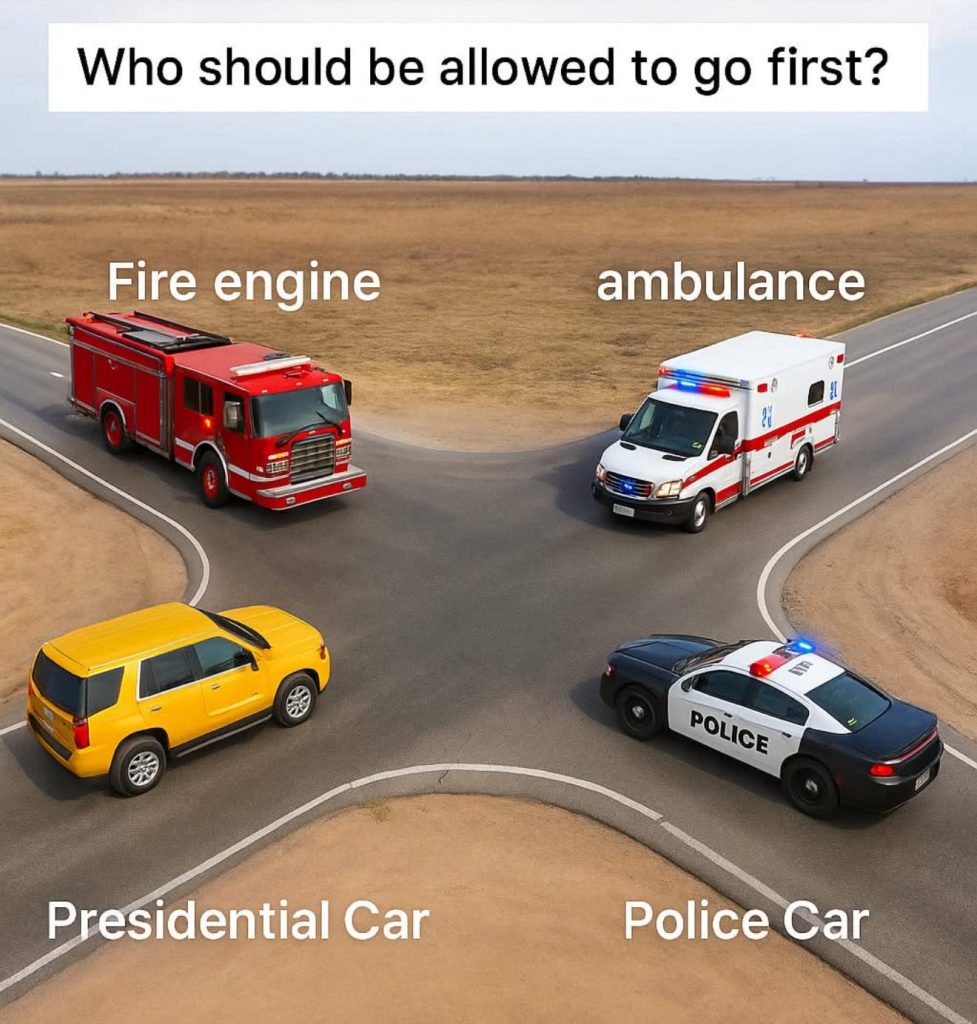Picture this: you’re at a four-way intersection in the middle of a quiet highway. There are no traffic lights, no road signs, and no one directing traffic. Four vehicles arrive at the exact same time, each from a different direction. But these aren’t your average drivers. You’ve got a Fire Engine, an Ambulance, a Police Car, and a Presidential Vehicle.
Sounds like a setup from an action movie, right?
But here’s the twist: only one of them can legally go first. And your job is to figure out which one gets that invisible “green light.” You might think it’s obvious—but this puzzle has stumped thousands. Are you ready to test your instincts?

Why So Many People Get It Wrong
This puzzle plays with perception. People tend to pick the most “powerful” option based on emotion or status, not logic. It’s easy to assume that the President should go first. After all, they’re the most important person in the country, right?
Wrong. In real-world driving scenarios, especially under U.S. law, importance doesn’t always equal priority.
Others guess the police car. Some say the fire engine. A few immediately jump to the ambulance. But most people don’t stop to think about the actual rules of the road when it comes to emergency vehicles. And that’s where the challenge lies.
The trick is to focus on the facts, not the flash.
Video : Use this song
Let’s Break It Down, One Vehicle at a Time
To solve this, we need to look at the function of each vehicle and how traffic laws rank them in emergency situations. In the United States, when two or more emergency vehicles meet at an uncontrolled intersection, priority is given based on the urgency and nature of their duties.
Let’s go through them step by step.
Ambulance
If the ambulance is actively responding to an emergency and its lights and sirens are on, it receives the highest priority. Why? Because it’s usually transporting someone in need of immediate medical attention—or it’s en route to a life-threatening call. Every second counts.
When life is literally hanging in the balance, the ambulance always comes first.
Fire Engine
Next in line is the fire engine. It’s definitely an emergency vehicle and usually rushing to a fire, hazardous materials incident, or rescue operation. These are urgent situations, but unless there’s a human life in immediate danger, they generally rank just below medical emergencies.
So if both the ambulance and fire truck arrive at the same time, the fire truck waits. It’s critical—but not more critical than saving a life in the back of an ambulance.

Police Car
The police are crucial, especially for controlling traffic, responding to crimes, or supporting other emergency services. However, unless they’re in active pursuit of a suspect or leading an official escort, they must yield to ambulances and fire trucks.
Police may enforce the rules, but they still follow them.
Presidential Car
Here’s where most people get tripped up. It’s easy to assume the President’s vehicle always has top priority. But unless it’s part of a secured and organized motorcade—with road closures, escorts, and security protocols—the presidential vehicle does not outrank emergency services.
If the vehicle isn’t actively escorted or creating a secure route, it follows standard traffic laws. That means it yields to any active emergency vehicle with lights and sirens on.
So in this case, the Presidential Car—despite the title and status—goes last.
The Correct Order, According to U.S. Traffic Law
So now that we’ve analyzed all four, here’s the legal and logical sequence of who goes first at the intersection:
- Ambulance
- Fire Engine
- Police Car
- Presidential Vehicle
This order reflects the urgency of duty, not the status of the individual inside. When it comes to saving lives, paramedics take the lead. Firefighters follow closely behind. Police provide support. And yes—even the President waits their turn.
Video : Which Car Should Pass The Intersection First | Right of Way Rule | Driving tips.
What Did You Choose? Let’s Hear It
Now that you’ve seen the logic behind the answer, be honest—did you guess right the first time?
Were you tempted by the shiny presidential car? Did the police cruiser make you pause? Or did you immediately zero in on the ambulance?
Drop your answer in the comments. Challenge a friend to solve it. Compare your reasoning and see how others think under pressure.
These kinds of puzzles aren’t just fun—they help sharpen your logic, attention to detail, and ability to make sound decisions based on facts, not assumptions.
If you enjoyed this brain-teaser, don’t stop here. There are plenty more riddles waiting to stretch your thinking and challenge your instincts.
Because at the end of the day, being right isn’t about guessing fast. It’s about thinking smart.